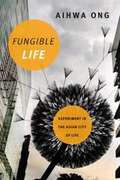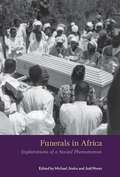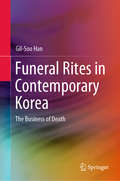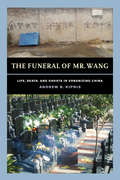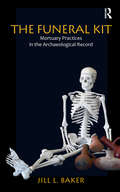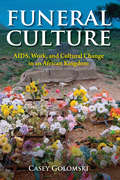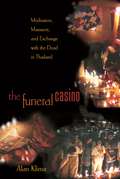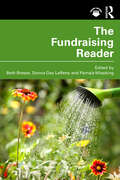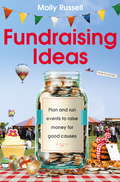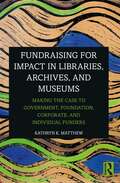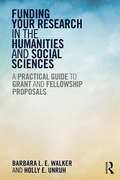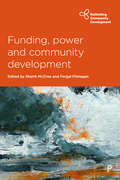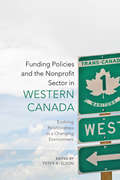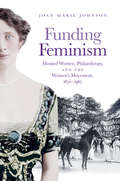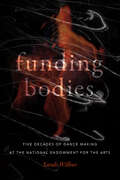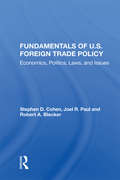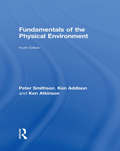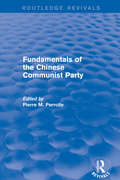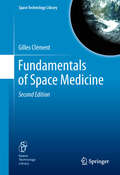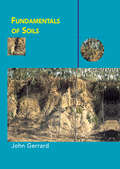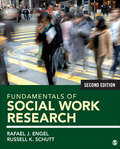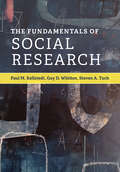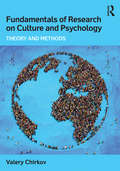- Table View
- List View
Fungible Life: Experiment in the Asian City of Life
by Aihwa OngIn Fungible Life Aihwa Ong explores the dynamic world of cutting-edge bioscience research, offering critical insights into the complex ways Asian bioscientific worlds and cosmopolitan sciences are entangled in a tropical environment brimming with the threat of emergent diseases. At biomedical centers in Singapore and China scientists map genetic variants, disease risks, and biomarkers, mobilizing ethnicized "Asian" bodies and health data for genomic research. Their differentiation between Chinese, Indian, and Malay DNA makes fungible Singapore's ethnic-stratified databases that come to "represent" majority populations in Asia. By deploying genomic science as a public good, researchers reconfigure the relationships between objects, peoples, and spaces, thus rendering "Asia" itself as a shifting entity. In Ong's analysis, Asia emerges as a richly layered mode of entanglements, where the population's genetic pasts, anxieties and hopes, shared genetic weaknesses, and embattled genetic futures intersect. Furthermore, her illustration of the contrasting methods and goals of the Biopolis biomedical center in Singapore and BGI Genomics in China raises questions about the future direction of cosmopolitan science in Asia and beyond.
Funerary Practices and Models in the Ancient Andes
by Peter Eeckhout Lawrence S. Owens"This edited volume focuses on the funerary archaeology of the Pan-Andean area in the pre-Hispanic period. The contributors examine the treatment of the dead and provide an understanding of how these ancient groups coped with mortality, as well as the ways in which they strove to overcome the effects of death. The contributors also present previously unpublished discoveries and employ a range of academic and analytical approaches that have rarely--if ever--been utilised in South America before. The book covers the Formative Period to the end of the Inca Empire, and the chapters together comprise a state-of-the-art summary of all the best research on Andean funerary archaeology currently being carried out around the globe"--
Funerals In Africa
by Joel Noret Michael JindraAcross Africa, funerals and events remembering the dead have become larger and even more numerous over the years. Whereas in the West death is normally a private and family affair, in Africa funerals are often the central life cycle event, unparalleled in cost and importance, for which families harness vast amounts of resources to host lavish events for multitudes of people with ramifications well beyond the event. Though officials may try to regulate them, the popularity of these events often makes such efforts fruitless, and the elites themselves spend tremendously on funerals. This volume brings together scholars who have conducted research on funerary events across sub-Saharan Africa. The contributions offer an in-depth understanding of the broad changes and underlying causes in African societies over the years, such as changes in religious beliefs, social structure, urbanization, and technological changes and health.
Funeral Rites in Contemporary Korea: The Business of Death
by Gil-Soo HanThis book explores 21st century Korean society on the basis of its dramatically transforming and rapidly expanding commercial funeral industry. With insights into contemporary Confucianism, shamanism and filial piety, as well as modernisation, urbanisation, the division of labour and the digitalisation of consumption, it is the first study of its kind to offer a sophisticated, integrated sociological analysis of how the commodification of death intersects with capitalism, popular culture and everyday life in contemporary Korea. Through innovative analyses of funeral advertising and journalism, screen and literary representations of funerals, online media, consumer accounts of using funeral services and other sources, it offers a complex picture of the widespread effects of economic development, urbanisation and modernisation in South Korean society over the past quarter century. In the aftermath of the Korean “economic miracle” novel ways of paying respect to deceased kin have emerged; using Max Weber's concept of “pariah capitalism”, Gil-Soo Han shows how the heightened obsession with and boom in the commodification of death in Korea reflects radical transformations in both capital and culture.
The Funeral of Mr. Wang: Life, Death, and Ghosts in Urbanizing China
by Andrew B. KipnisA free open access ebook is available upon publication. Learn more at www.luminosoa.org. In rural China funerals are conducted locally, on village land by village elders. But in urban areas, people have neither land for burials nor elder relatives to conduct funerals. Chinese urbanization, which has increased drastically in recent decades, involves the creation of cemeteries, state-run funeral homes, and small private funerary businesses. The Funeral of Mr. Wang examines social change in urbanizing China through the lens of funerals, the funerary industry, and practices of memorialization. It analyzes changes in family life, patterns of urban sociality, transformations in economic relations, the politics of memorialization, and the echoes of these changes in beliefs about the dead and ghosts.
The Funeral Kit: Mortuary Practices in the Archaeological Record
by Jill L BakerStudies of mortuary archaeology tend to focus on difference—how the researcher can identify age, gender, status, and ethnicity from the contents of a burial. Jill L. Baker’s innovative approach begins from the opposite point: how can you recognize the commonalities of a culture from the “funeral kit” that occurs in all burials, irrespective of status differences? And what do those commonalities have to say about the world view and religious beliefs of that culture? Baker begins with the Middle and Late Bronze Age tombs in the southern Levant, then expands her scope in ever widening circles to create a general model of the funeral kit of use to archaeologists in a wide variety of cultures and settings. The volume will be of equal value to specialists in Near Eastern archaeology and those who study mortuary remains in ancient cultures worldwide.
Funeral Culture: AIDS, Work, and Cultural Change in an African Kingdom
by Casey GolomskiContemporary forms of living and dying in Swaziland cannot be understood apart from the global HIV/AIDS pandemic, according to anthropologist Casey Golomski. In Africa’s last absolute monarchy, the story of 15 years of global collaboration in treatment and intervention is also one of ordinary people facing the work of caring for the sick and dying and burying the dead. Golomski’s ethnography shows how AIDS posed challenging questions about the value of life, culture, and materiality to drive new forms and practices for funerals. Many of these forms and practices―newly catered funeral feasts, an expanded market for life insurance, and the kingdom’s first crematorium―are now conspicuous across the landscape and culturally disruptive in a highly traditionalist setting. This powerful and original account details how these new matters of death, dying, and funerals have become entrenched in peoples’ everyday lives and become part of a quest to create dignity in the wake of a devastating epidemic.
The Funeral Casino: Meditation, Massacre, and Exchange with the Dead in Thailand
by Alan KlimaThe Funeral Casino is a heretical ethnography of the global age. Setting his book within Thailand's pro-democracy movement and the street massacres that accompanied it, Alan Klima offers a strikingly original interpretation of mass-mediated violence through a study of funeral gambling and Buddhist meditation on death. The fieldwork for the book began in 1992, when a freewheeling market of illegal "massacre-imagery" videos blossomed in Bangkok on the very site where, days earlier, for the third time in two decades, a military-controlled government had killed scores of unarmed pro-democracy protesters. Such killings and their subsequent representation have lent force to Thailand's transition from military control to a "media-financial complex." Probing the ways in which death is marketed, visualized, and remembered through practices both local and global, Klima inverts conventional relationships between ethnography and theory through a compelling narrative that reveals a surprising new direction available to anthropology and critical theory. Ethnography here engages with the philosophy of activism and the politics of memory, media representation of violence, and globalization. In focusing on the particular array of tactics in Thai Buddhism and protest politics for connecting death and life, past and present, this book unveils a vivid and haunting picture of community, responsibility, and accountability in the new world order.
The Fundraising Reader
by Beth Breeze Donna Day Lafferty Pamala WiepkingThe Fundraising Reader draws together essential literature establishing a one-stop body of knowledge that explains what fundraising is, and covers key concepts, principles and debates. The book shines a light on the experience of being a fundraiser and answers an urgent need to engage with the complexities of a facet of the non-profit sector that is often neglected or not properly understood. This international compilation features extracts from key writing on fundraising, with a comprehensive contextualising introduction by the editors. Uniquely, this Reader shares conflicting positions relating to age-old and current debates on fundraising: Is fundraising marketing? Should donors or the community be front and centre in fundraising? How can fundraisers deal with ethical dilemmas such as ‘tainted’ donors and money? Best practice and future trends are also covered, including the impact of new technologies and responding to demands for greater diversity, inclusion, and equity in fundraising teams. This Reader is for those who seek to further develop their own understanding of fundraising, and it provides an invaluable resource for academic courses and professional training.
Fundraising Ideas: Plan and run events to raise money for good causes
by Molly RussellThis book is written to assist those planning a fund-raising event, especially for those new to fund-raising, to share hints and ideas to help lead them around some of the pitfalls. Although tackling a fundraising event seems a daunting task to many, Molly Russell?s light hearted approach shows that with careful planning, a little hard work and a good sense of humour - fundraising can be fun! This book contains a wealth of useful information in an easy-to-read format. .
Fundraising Ideas: Plan and run events to raise money for good causes
by Molly RussellThis book is written to assist those planning a fund-raising event, especially for those new to fund-raising, to share hints and ideas to help lead them around some of the pitfalls. Although tackling a fundraising event seems a daunting task to many, Molly Russell’s light hearted approach shows that with careful planning, a little hard work and a good sense of humour - fundraising can be fun! This book contains a wealth of useful information in an easy-to-read format. .
Fundraising for Impact in Libraries, Archives and Museums: Making the Case to Government, Foundation, Corporate and Individual Funders
by Kathryn K. MatthewFundraising for Impact in Libraries, Archives, and Museums provides practical advice that will help LAMs reassess how to leverage their organizational assets in ways that support communities and help to forge productive relationships with foundation, individual, corporate, and government funders. Drawing on the insights gleaned from interviews with more than 100 international LAM practitioners, the book examines the common fundraising challenges that LAM institutions of all types and sizes face. During today’s dynamic times, when many LAMs are seeking to remain relevant and viable, Matthew emphasizes how vital it is for them to demonstrate and communicate how they benefit their communities. The book presents five frameworks used in community development and philanthropy and illustrates how they can help an institution to assess and communicate its impact, focus its mission-related activities, and effectively deploy proven fundraising strategies. Vignettes from the interviews are presented throughout, along with pointers, to illustrate actionable approaches that the reader can adapt as they seek contributed financial resources. The reader will explore various fundraising scenarios to help secure resources including appeals, special events, moves management, digital media, and corporate philanthropy. Fundraising for Impact in Libraries, Archives, and Museums is essential reading for library, archive, and museum practitioners and fundraisers working around the world.
Funding Your Research in the Humanities and Social Sciences: A Practical Guide to Grant and Fellowship Proposals
by Barbara L. Walker Holly E. UnruhGrants and fellowships are increasingly essential to an academic career, and competition over federal and foundation funding is fiercer than ever. Yet there has hitherto been little training available for this genre of writing. Funding Your Research in the Humanities and Social Sciences demystifies the process of writing winning grant proposals in the humanities and social sciences. Offering practical guidance, step-by-step instructions, and examples of successful proposals, Walker and Unruh outline the best practices to crack the proposal writing code. They reveal the most common peeves of proposal reviewers, and offer advice on how to avoid frequent problem areas in conceptualizing and crafting a research proposal in the humanities and social sciences. Contributions from agency and foundation program officers offer the perspective from the other side of the proposal submission portal, and new research funding trends, including crowdfunding and public scholarship, are also covered. This book is essential reading for all those involved in funding applications. Graduate students, research administrators, early career faculty members, and tenured professors alike will gain new and effective strategies to write successful applications.
Funding, Power and Community Development
by Niamh McCrea and Fergal FinneganThis edited collection critically explores the funding arrangements governing contemporary community development and how they shape its theory and practice. International contributions from activists, practitioners and academics consider the evolution of funding in community development and how changes in policy and practice can be understood in relation to the politics of neoliberalism and contemporary efforts to build global democracy from the ‘bottom up’. Thematically, the collection explores matters such as popular democracy, the shifting contours of the state-market relationship, prospects for democratising the state, the prospects for community autonomy, the effects of managerialism and hybrid modes of funding such as social finance. The collection is thus uniquely positioned to stimulate critical debate on both policy and practice within the broad field of community development.
Funding Policies and the Nonprofit Sector in Western Canada: Evolving Relationships in a Changing Environment
by Peter R. ElsonFunding Policies and the Nonprofit Sector in Western Canada offers a detailed yet accessible account of nonprofit funding policies in a region characterized by fiscal conservatism, a cyclical resource-based economy, and a growing share of Canada's population and GDP.The chapters in this collection offer compelling and candid analyses of the realities of nonprofit funding in Western Canada. Each combines practical insights with academic rigour, providing critical historical context and an up-to-date profile of funding for services. For each province, a leading practitioner has provided an insider perspective into a specific regime or organization: nonprofit housing in British Columbia; the politics of social policy in Alberta; sport, culture, and recreation, and lottery funds in Saskatchewan; and community economic development in Manitoba.Written by leading researchers and practitioners, Funding Policies and the Nonprofit Sector in Western Canada offers a solid foundation on which policymakers, scholars, and practitioners alike can examine the challenges and opportunities of the contemporary funding environment.
Funding Feminism: Monied Women, Philanthropy, and the Women’s Movement, 1870–1967 (Gender and American Culture)
by Joan Marie JohnsonJoan Marie Johnson examines an understudied dimension of women's history in the United States: how a group of affluent white women from the late nineteenth through the mid-twentieth centuries advanced the status of all women through acts of philanthropy. This cadre of activists included Phoebe Hearst, the mother of William Randolph Hearst; Grace Dodge, granddaughter of Wall Street "Merchant Prince" William Earle Dodge; and Ava Belmont, who married into the Vanderbilt family fortune. Motivated by their own experiences with sexism, and focusing on women's need for economic independence, these benefactors sought to expand women's access to higher education, promote suffrage, and champion reproductive rights, as well as to provide assistance to working-class women. In a time when women still wielded limited political power, philanthropy was perhaps the most potent tool they had. But even as these wealthy women exercised considerable influence, their activism had significant limits. As Johnson argues, restrictions tied to their giving engendered resentment and jeopardized efforts to establish coalitions across racial and class lines. As the struggle for full economic and political power and self-determination for women continues today, this history reveals how generous women helped shape the movement. And Johnson shows us that tensions over wealth and power that persist in the modern movement have deep historical roots.
Funding Bodies: Five Decades of Dance Making at the National Endowment for the Arts
by Sarah WilburFive Decades of Dance Making at the National Endowment for the Arts
Fundamentals Of U.s. Foreign Trade Policy: Economics, Politics, Laws, And Issues
by Stephen D. CohenThis unique text integrates for the first time the three critical aspects of U.S. foreign trade policy formulation and implementation: economics, politics, and laws. In a comprehensive and nonjudgmental manner, a political scientist, an economist, and a legal scholar combine efforts to present a well-rounded view of the nature and impact of trade p
Fundamentals of the Physical Environment: Fourth Edition
by Peter Smithson Ken Addison Ken AtkinsonFundamentals of the Physical Environment has established itself as a well-respected core introductory book for students of physical geography and the environmental sciences. Taking a systems approach, it demonstrates how the various factors operating at Earth’s surface can and do interact, and how landscape can be used to decipher them. The nature of the earth, its atmosphere and its oceans, the main processes of geomorphology and key elements of ecosystems are also all explained. The final section on specific environments usefully sets in context the physical processes and human impacts. This fourth edition has been extensively revised to incorporate current thinking and knowledge and includes: a new section on the history and study of physical geography an updated and strengthened chapter on climate change (9) and a strengthened section on the work of the wind a revised chapter (15) on crysosphere systems - glaciers, ice and permafrost a new chapter (23) on the principles of environmental reconstruction a new joint chapter (24) on polar and alpine environments a key new joint chapter (28) on current environmental change and future environments new material on the Earth System and cycling of carbon and nutrients themed boxes highlighting processes, systems, applications, new developments and human impacts a support website at www.routledge.com/textbooks/9780415395168 with discussion and essay questions, chapter summaries and extended case studies. Clearly written, well-structured and with over 450 informative colour diagrams and 150 colour photographs, this text provides students with the necessary grounding in fundamental processes whilst linking these to their impact on human society and their application to the science of the environment.
Fundamentals of the Chinese Communist Party (Routledge Revivals)
by Pierre M. PerrolleThis title was first published in 1976. From 1966 to 1969 the large-scale political turmoil and intense conflicts of the Cultural Revolution in China shattered notions of institutional permanence and unshakable legitimacy that many analysts had come to associate with the Communist Party of China, which had ruled the People's Republic for over fifteen years. Just as the high-level bureaucrats of the Party were shaken from their complacency, it seemed for a time, from the outside, as though it could no longer be taken for granted that the Communist Party would continue to provide the institutional core for political leadership in China. Fundamentals of the Party (Tang ti chi-ch'u chih-shih), which we are translating and publishing here as Fundamentals of the Chinese Communist Party, was published by the Shanghai People's Press in 1974 and constitutes an important source of the type needed to study the revival of the Party.
Fundamentals of Space Medicine
by Gilles ClémentInvestigations in space have led to fundamental discoveries of the human body to the space environment. Gilles Clément has conducted extensive research in this field. This readable text presents the findings from the life science experiments conducted during and after space missions. About 1200 human space flights have been completed to date, including more than 500 astronauts from various countries, for a combined total presence in space of about 90 years. The first edition of this title was published in 2005 (written in 2003 - 2004), and new data is now available from crewmembers participating in long-duration flights on board the International Space Station (ISS). The number of astronauts who have spent six months in orbit has doubled since 2004. On board the ISS, the astronauts use newly developed pharmaceutical countermeasure for bone loss (such as biophosphonates) and state-of-the-art exercise resistive devices against muscle atrophy and cardiovascular deterioration. The ISS life support systems now use advanced closed-loop systems for meeting the needs of a 6-person crew, including recycling urine to water. Some of these new technologies have potential spin-offs for medical (i.e., sedentary life style, obesity) and environmental issues here on Earth. And finally, there are new space research opportunities with the Orion space vehicle that will soon replace the Space Shuttle, the Moon, and Mars space exploration program that is slowly but surely taking shape, and the space tourism sector that has become a reality. The focus on this edition is the ISS, Orion and planetary exploration, and space tourism. This edition also includes more than 20% new material, along with photographs, data, and video clips for Springer Extras!
Fundamentals of Soils (Routledge Fundamentals of Physical Geography)
by John GerrardFundamentals of Soil provides a comprehensive and engaging introduction to soils and the workings of soil systems. This text is the only one of its kind to provide an attractive, lively and accessible introduction to this topic. Featuring learning tools within each chapter, such as summaries, essay questions and guides for further reading, the text is also highly illustrated with useful tables, boxes and figures. Covering all key areas of study at an introductory level, subjects covered include:· Soil properties· Soil processes· Controls on soil formation· Soil classification· World soils· Soil patterns· Soil degradation.
Fundamentals of Social Work Research
by Rafael J. Engel Russell K. SchuttDesigned to help students develop skills in evaluating research and conducting studies, this brief version of Rafael J. Engel and Russell K. Schutt’s popular, The Practice of Research in Social Work, makes principles of evidence-based practice come alive through illustrations of actual social work research. With integration of the CSWE Competencies, the text addresses issues and concerns common to the discipline and encourages students to address diversity and ethics when planning and evaluating research studies. The Second Edition includes a focus on qualitative research, a new chapter on research ethics, new sections on mixed methods research and community-based participatory research, and more.
The Fundamentals of Social Research
by Paul M. Kellstedt Guy D. Whitten Steven A. TuchThis textbook provides an introduction to the scientific study of sociology and other social sciences. It offers the basic tools necessary for readers to become both critical consumers and beginning producers of scientific research on society. The authors present an integrated approach to research design and empirical analyses in which researchers can develop and test causal theories. They use examples from social science research that students will find engaging and inspiring and that will help them to understand key concepts. The book makes technical materials accessible to students who might otherwise be intimidated by mathematical examples. This new text, with the addition of sociologist Steven A. Tuch to the author team, follows the successful format, approach, and pedagogical features in Paul M. Kellstedt and Guy D. Whitten's bestselling text, The Fundamentals of Political Science Research, now in its third edition. Workbooks in Stata, SPSS, and R, three of the most popular statistical analysis programs, are available as separate purchases to accompany this textbook, enabling students to connect the lessons of this book to hands-on applications of the software.
Fundamentals of Research on Culture and Psychology
by Valery ChirkovThis is the first book that provides detailed guidelines of how to conduct multi-disciplinary research to study people's behaviors in different cultures. Readers are encouraged to look beyond disciplinary boundaries to address issues between individuals and their socio-cultural environments so as to design the most effective studies possible. The core philosophical and theoretical assumptions that underlie the strategies, designs, and techniques used when researching cultural issues are examined. The book reviews all the steps that go into doing cultural research from formulating the research problem to selecting the most appropriate method for data analysis. Realist and interpretivist paradigms together with the theory of cultural models and quantitative, qualitative, mixed-method, and multiple-design strategies are reviewed. Case studies, ethnographies, and interviewing techniques are emphasized throughout. Chapters open with learning objectives and end with a conclusion, a glossary, questions, exercises, and recommended readings. Numerous multidisciplinary examples, tables, and figures demonstrate and synthesize the analysis of data. Information boxes provide historical notes and how-to boxes provide tips on methodological issues. Highlights include: -Encourages researchers to breach disciplinary boundaries to address the problems of human functioning in different cultures (Chs. 1 & 2). -Introduces readers to the theory of cultural models that helps bridge the human mind and socio-cultural realities (Chs. 2 & 10). -Propagates the realist and interpretivist philosophical paradigms for doing cultural studies and demonstrates how to use these approaches when studying people in different cultures (Chs. 3 & 4). -Helps readers formulate productive research questions, articulate concepts, and understand the role theories play in cultural research (Ch. 5 - 6). -Reviews research designs including case-based and variable-based ones, person-centered ethnography, interviewing, and quantitative studies (Chs. 7 - 10). -www.routledge.com/9780415820325/ provides instructors with Power Points, additional references and studies, and questions for discussion and evaluation for each chapter and students with chapter outlines and objectives, key terms and concepts with a hotlink to the definition, and suggested readings and websites. Part 1 explores disciplinary and theoretical thinking to help readers connect different disciplines, theories, and philosophical paradigms in a logical way. Part 2 reviews planning research with an emphasis on defining the research problem. Here readers learn to articulate the purpose of the study and the research questions, work with related conceptual and theoretical foundations, and identify various research strategies including nomothetic and idiographic approaches, variable- and case-based studies, and potential sampling problems. Part 3 reviews the practical aspects of doing cultural research -- how to use various research designs including experimental, quasi-experimental, correlational studies, mixed method designs, and ethnographic and qualitative studies. Methodological problems specific to researching cultural issues such as the equivalence of concepts, the translation of instruments, and verifying measurement invariance are reviewed. Readers are also introduced to ethnography including practical elements such as language training, formal document requirements, and issues related to working in an unfamiliar community. The book concludes with the most crucial aspects of conducting ethical cultural psychological research. Intended for advanced undergraduate or graduate courses that conduct cultural or cross-cultural research including cross-(cultural) psychology, culture and psychology, or research methods/design courses in psychology, anthropology, sociology, cultural studies, social work, education, geography, international relations, business, nursing, public health, and communication, the book also appeals to researchers interested in conducting cross-cultural and cultural studies. Pre...
